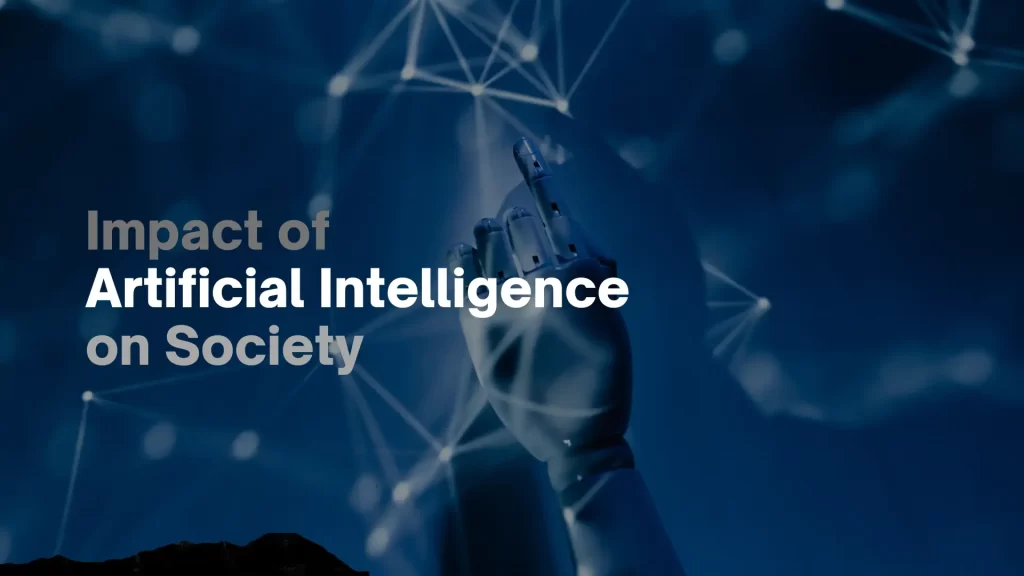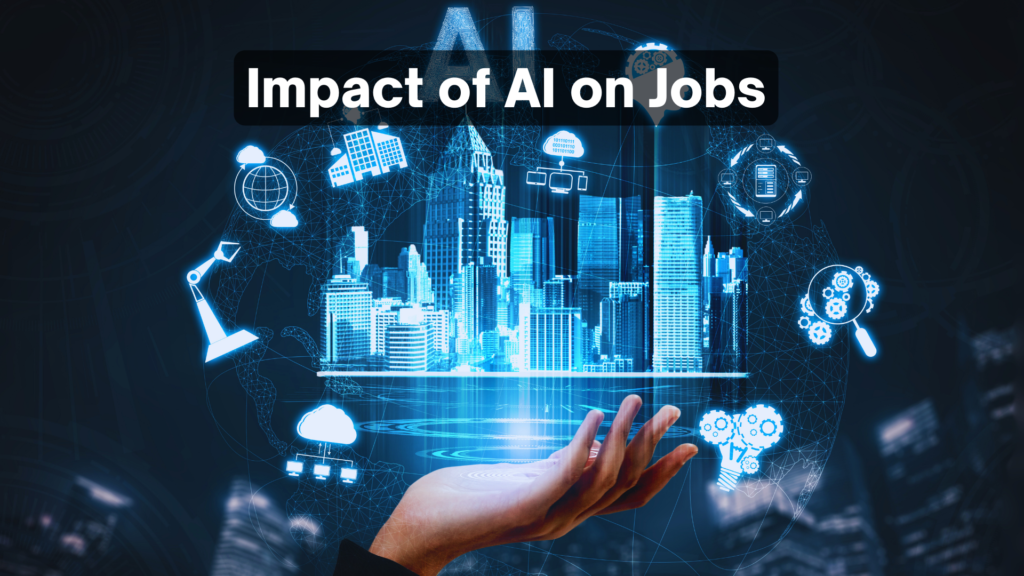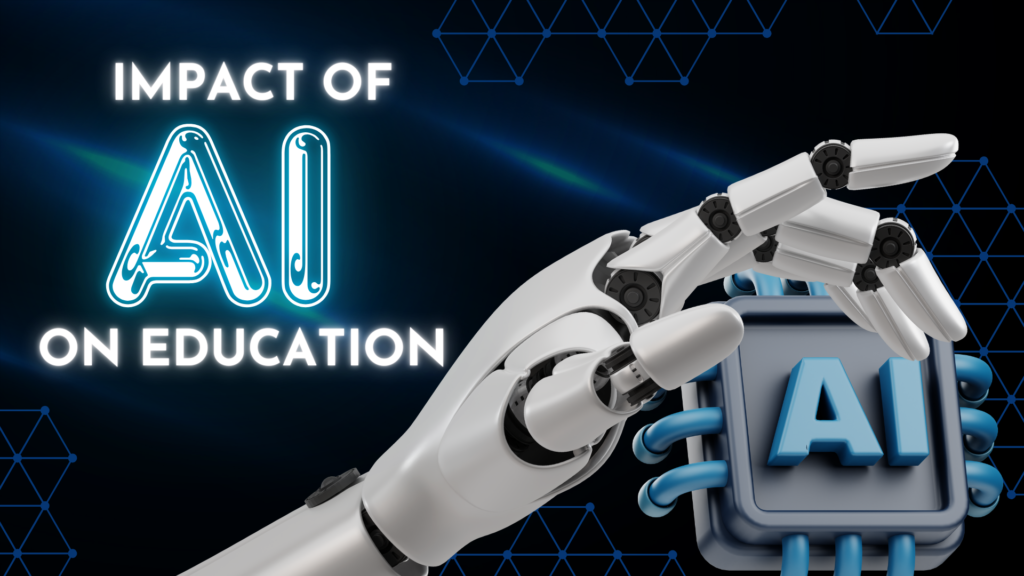Artificial intelligence (AI) is no longer science fiction. It’s rapidly weaving itself into the fabric of our society, transforming the way we live, work, and interact with the world around us. From the algorithms recommending videos on your favorite streaming service to the robots assembling cars in factories, AI’s influence is undeniable. But what exactly is the impact of AI? This article delves into both the positive and negative ramifications of AI on society, jobs, unemployment, daily life, education, human life, and human labor.
Impact of Artificial Intelligence on Society

The impact of AI on society is multifaceted. It can be positive or negative. Here are some key areas where AI is acting as a catalyst for change:
- Enhanced Efficiency and Productivity: AI automates repetitive tasks, freeing human workers to focus on more strategic and creative endeavors. In manufacturing, robots can perform complex assembly lines faster and more precisely. AI-powered logistics systems can optimize transportation routes, saving time and fuel. This translates to increased efficiency across industries, leading to economic growth and improved resource allocation.
- Data-Driven Decisions: AI excels at analyzing massive datasets, allowing for data-driven decision-making across various sectors. Financial institutions leverage AI to assess credit risks and detect fraudulent activity more effectively. Healthcare providers can utilize AI for early disease detection and personalized treatment plans, potentially improving health outcomes. Governments can use AI to analyze trends and make informed policy decisions on resource allocation and infrastructure development.
Beyond Efficiency: AI’s Societal Benefits
AI is not just about efficiency; it has the potential to create a better future for all:
- Scientific Breakthroughs: AI accelerates scientific discovery by crunching massive datasets, identifying patterns invisible to human researchers. This can lead to advancements in drug development, materials science, and climate change mitigation strategies. AI can analyze complex weather patterns, potentially leading to more accurate climate models and better disaster preparedness.
- Improved Quality of Life: AI is making our daily lives more convenient and comfortable. Smart home systems regulate temperature and lighting based on our preferences. AI-powered virtual assistants manage our schedules, shopping lists, and even remind us to take medication. AI-driven traffic management systems can reduce congestion and improve commutes.
Impact of AI on Jobs: Automation and Reskilling

One of the most pressing concerns surrounding AI is its impact on jobs. Automation powered by AI can potentially render some jobs obsolete, particularly those involving repetitive tasks in manufacturing, customer service, and data entry. This raises concerns about widespread unemployment and economic dislocation. However, it’s important to consider AI’s impact on the job market holistically:
- Job Creation: While some jobs may disappear, new ones will emerge. AI will create demand for skilled workers who can design, develop, maintain, and interact with AI systems. Data scientists, AI engineers, and cybersecurity specialists are just a few examples of these new roles.
- Reskilling and Upskilling the Workforce: The key to navigating the changing job market lies in reskilling and upskilling the workforce. Educational institutions need to equip students with the skills necessary to thrive in an AI-driven economy. This includes critical thinking, problem-solving, creativity, and the ability to collaborate effectively with AI systems.
Impact of AI on Unemployment: A Looming Challenge

Despite the creation of new jobs, AI-driven automation poses a significant challenge: managing unemployment during the transition period. Here are some potential solutions:
- Universal Basic Income (UBI): UBI is a policy proposal that would provide every citizen with a guaranteed basic income, regardless of employment status. For individuals who are displaced by automation, this might offer a sense of security.
- Focus on Soft Skills: As AI takes over routine tasks, human workers will need to excel in areas where AI falls short. Soft skills such as communication, emotional intelligence, and leadership will become increasingly valuable. Educational programs and training initiatives should prioritize these skills to help workers adapt to the changing job market.
Impact of Artificial Intelligence on Everyday Life
AI is already integrated into our daily lives, often invisibly. From the moment we wake up to smart alarms, AI personalizes our online experiences, filters our emails, and powers the smart devices in our homes. Here’s a glimpse into how AI will continue to shape our everyday lives:
- Personalized Services: AI can anticipate our needs and provide personalized recommendations and services. Imagine a grocery store that automatically generates a shopping list based on your past purchases and dietary preferences. AI-powered travel assistants can create personalized itineraries based on your interests and budget.
Beyond Convenience: AI’s Impact on Daily Life
The impact of AI on daily life goes beyond mere convenience:
- Smart Cities (continued): Leading to safer and more efficient cities. AI can be used to analyze waste management data and optimize collection routes, leading to cleaner and more sustainable cities.
- Enhanced Healthcare: AI-powered diagnostics and treatment plans will revolutionize healthcare. AI can analyze medical images with superhuman accuracy, aiding in early disease detection and personalized medicine. AI-powered chatbots can provide basic healthcare advice and answer patient questions, reducing the burden on doctors and improving access to healthcare.
Impact of AI on Education: Personalized Learning for All

AI has the potential to personalize education, catering to individual learning styles and paces. Here’s how AI can transform the educational landscape:
- Adaptive Learning Platforms: AI-powered platforms can tailor learning materials and pace to each student’s individual needs. Students can progress at their own speed, focusing on areas where they need more practice and receiving additional support when struggling. This personalization can lead to improved learning outcomes and increased student engagement.
- Automated Grading and Feedback: AI can automate the grading of certain types of assessments, freeing teachers to focus on providing more personalized feedback and guidance to students. AI-powered tutors can offer real-time feedback and answer student questions, providing additional support outside of the classroom.
Beyond the Classroom: AI’s Impact on Education
The impact of AI on education extends beyond the classroom walls:
- Accessibility and Equity: AI-powered language translation tools can help break down language barriers and provide equal access to education for all students. AI can be used to personalize learning materials for students with disabilities, creating a more inclusive learning environment.
- Lifelong Learning: AI-powered platforms can assist with lifelong learning by providing personalized learning recommendations and courses tailored to individual needs and goals. This can empower individuals to continuously update their skills and knowledge throughout their lives.
Impact of AI on Human Life: A Force for Good?
AI has the potential to significantly impact human life in various ways:
- Improved Decision-Making: AI can analyze vast amounts of data and identify patterns that humans might miss. This can inform decision-making in areas such as healthcare, finance, and criminal justice, potentially leading to better outcomes.
- Augmented Creativity: AI can be used as a creative tool, assisting humans in tasks such as writing, composing music, and designing products. This can lead to a new era of human-AI collaboration in the creative fields.
- Ethical Concerns: However, the use of AI in decision-making raises ethical concerns about bias and accountability. It’s crucial to ensure that AI algorithms are developed and used ethically, without perpetuating existing societal biases.
Impact of Artificial Intelligence on Human Labor
AI and humans are expected to work closely together in the workplace of the future. Here’s what this might look like:
- Complementary Skills: AI excels at tasks requiring data analysis, pattern recognition, and repetitive execution. Humans excel at tasks requiring creativity, critical thinking, emotional intelligence, and social interaction. The future workplace will leverage the strengths of both humans and AI, leading to a more productive and efficient workforce.
- Human-Centered Design: As AI takes over more tasks, human workers will need to focus on higher-level skills and tasks that require human judgment and empathy. This shift will necessitate a focus on human-centered design principles, ensuring that AI systems are designed to complement and augment human capabilities.
Conclusion: The Future of AI
The impact of AI on society is still unfolding. While AI presents both opportunities and challenges, it’s clear that it has the potential to revolutionize our world. By harnessing the power of AI responsibly and ethically, we can create a future that benefits all of humanity. This future requires ongoing dialogue and collaboration between policymakers, researchers, businesses, and individuals to ensure that AI is developed and used for the betterment of society.
This article has explored just a glimpse of the multifaceted impact of AI. The impact of AI on our lives will grow as it develops further. It’s up to us to ensure that this impact is positive and leads to a brighter future for all.
